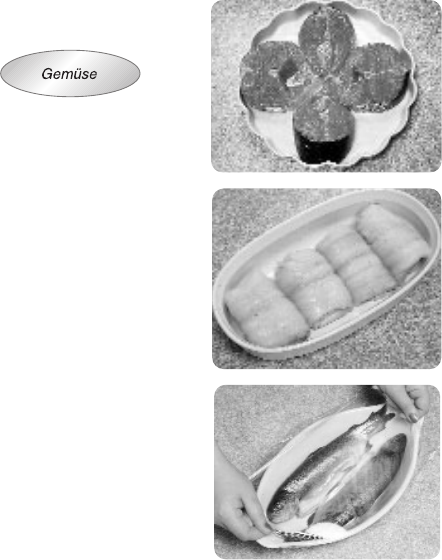
En-70
General advice
Automatic Cooking
Fresh Fish
(200 - 1000 g) Fish
Fillet eg. Paice, Cod,
Sea-salmon, redfish,
wolf fish or salmon
filet. Refer to page En-
16 for instructions.
Arranging the fish:
fish steaks should be
arranged in a circle
with the thickest part
on the outside.
Uneven or very thin
fish fillets should be
rolled or folded in
order to protect the
thin parts. Whole
small fish (herring,
trout, mackerel)
should be arranged head to tail.
Liquid: add a little stock, white wine or lemon
juice to the fish before cooking. Allow 2 to 3
tbsp per 500g of fish. Adding more liquid will
slow down the cooking process, whereas less
liquid will speed it up.
Salt: do not add salt before cooking as this will
dry out the fish, but you can add pepper and
herbs before cooking.
Composition of the fish: a fillet of oily fish
(halibut, salmon, mackerel) will cook more
quickly than a fillet of white fish (pollock,
whiting, ling). Take this into account by possibly
adding a little more liquid or reducing the
cooking time.
Cooking: when the fish becomes opaque and
starts to come apart when flaked, it is cooked.
Noise: it is normal to hear small noises during
cooking (made by the steam trapped between
the flesh and skin escaping). This noise occurs
more frequently when cooking oily fish such as
salmon or mackerel. You can reduce the noise
by pricking the fish skin in several places.
Speed: fish cooks very quickly in the
microwave; do not cook it until the last minute,
to avoid the need to reheat.
Shellfish: shellfish can be put in the oven as
are they are, but must be taken out as they
open, otherwise they will dry out; if they are
stuffed, their preparation and cooking depends
on the type of filling.
Large fish (more than 500g): it recommended
to turn the fish half-way through cooking and to
protect the tail and head with a small piece of
aluminium foil to avoid possible overcooking.
(Warning: the aluminium must be more than
2cm away from the oven walls).
Fish parcels: you can cook fish parcels in the
microwave by replacing the aluminium foil with
greaseproof paper (also called baking paper),
which is microwave safe.
Fish and shellfish


















